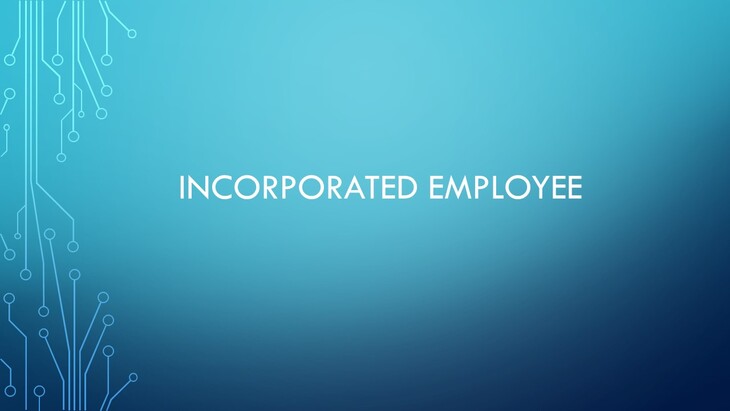
Incorporated Employees
We have heard a lot about the conversation around individuals operating through corporations back in the beginning of 2020 and then again in 2022 as CRA has intensified its scrutiny. Recently, CRA has released some information on a pilot project that CRA has initiated back in 2022 with a aim to identify incorporated employees and how to increase tax compliance. The pilot project was started in 2022. It is called a ‘PSB Pilot project’. This was an opportunity to provide education to corporations which are hiring PSBs and those who are operating as PSB. The purpose was to help business owners to understand clearly and then comply with their tax obligations.
What is Personal Service Business (PSB)
A Personal Service business (PSB) is defined u/s 125(7) of Income Tax Act where a corporation carries on a business of providing the personal services of an individual (the ‘corporate employee’) to another person who, absent the corporation, could typically be considered as the individual’s employer. If an incorporated employee is not a specified shareholder, then a personal service business will not arise. A specified shareholder is a shareholder who owns at least 10% of the issued shares of any class of the corporation. Exception to this designation include corporations that employs more than five full-time employees or those receiving payment for services from an associated business.
Why having a corporation is a beneficial?
Why employees who are on payroll decides to incorporate and works as incorporated employee. One of main advantage of having a corporation is the lower tax rate of a corporation. Usually, in Canada, a small business corporation with less than $500,000 of taxable income enjoys a tax rate of 12% (approx..) including both federal and provincial tax rates. The low rate is available on active income of the corporation due to a small business deduction which is almost 19% in 2023. This offers a huge tax saving when we compare to personal tax rates which starts at combined tax rate at 20% but gradually climb to as much as 53.53% when individual’s income exceeding $235,675 (Tax year 2023).
What tax rate a PSB corporation pays
Income Tax Act ‘s section 125(7) provides the definition of active business carried on by a corporation and excludes a ‘personal services businesses’ from the definition of active businesses. So, a PSB is not eligible for the small business deduction but rather it pays the full tax rate on taxable income. In addition, PSB corporation is subject to an additional tax rate of 5%. In other words, a PSB corporation pays tax at 33% as compared to 12% paid by small business corporation which carries on active business. This represents a 21% additional tax for being a PSB corporation or not carrying on active business in corporation.
Evaluating CRA’s Pilot Project
Under Phase 1, CRA conducted the process of identifying companies that hire PSBs from June 2022 to December 2022.
Key Results of Phase 1
• Around 10% of the corporation selected by CRA were likely utilizing PSBs.
• Around 64% of potentials PSBs are incorrectly claiming the small business deductions (SBD) for which they were not eligible.
• On an average, these potential PSBs are underpaying an average of $16,711 in corporate tax.
• Three major sectors/industries have 74% of the potential PSBs:
o Transportation and Warehousing (35%) – Around 95% are withing general freight trucking or specialized freight trucking.
o Professional corporations (26%)
o Construction (13%)
CRA states that phase 1 provides a limited view of PSB activities, and CRA cannot apply these findings to all industries.
Phase 2 - Identifying potential PSBs
CRA is conducting the phase 2 of the project during October 2023 to June 2024. In this phase, CRA is going to achieve the following:
- Examine potential PSBs
- Conducting interview of PSB to gain understanding of PSB business and to get insight on how and why PSB operate the way they do
- Reviewing the corporation accounts to find out if they are possibly PSBs
- Provide continuing education on PSB’s tax obligation
- Review of PSB’s 2022 tax year
Phase 3 - Compliance for PSBs.
Based on the outcome of phase 2, CRA will be performing help to these PSBs to comply with tax obligations, and provide continued education. CRA will be reviewing their books and records to determine the ultimate impact.
CRA’s website provide the details about development of the above project. Reader can contract CRA directly for more information.
TAX Implications
If CRA classifies your corporation as a PSB, then the corporation will not be allowed to small business deduction and general rate reduction. In addition, the personal service businesses cannot deduct most expenses available to other corporations. These includes telephone, meals, office supplies etc. However, personal services businesses are allowed to deduct the salary and wages paid to incorporated employees.
Conclusion
The major impact of this project will be on transport industry and professional corporations. It is necessary and a best time for most of the PSB corporations to understand the type of corporation they are running and whether they will be subject to any additional tax if their corporation is classified as a personal service business. It is a time to review your working and consult a professional accountant